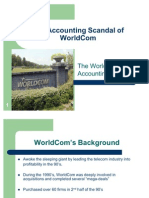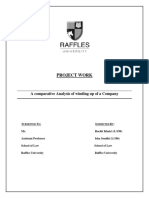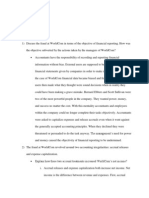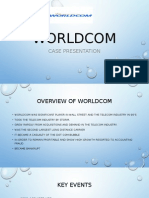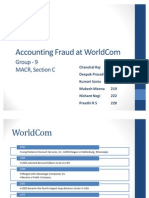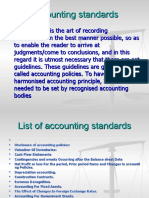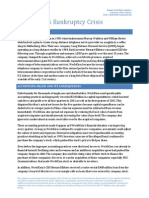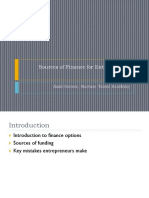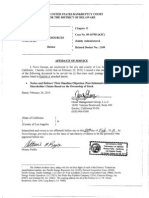WorldCom Scandal
WorldCom Scandal
Uploaded by
chulipzCopyright:
Available Formats
WorldCom Scandal
WorldCom Scandal
Uploaded by
chulipzCopyright
Available Formats
Share this document
Did you find this document useful?
Is this content inappropriate?
Copyright:
Available Formats
WorldCom Scandal
WorldCom Scandal
Uploaded by
chulipzCopyright:
Available Formats
WorldCom Scandal: A Look Back at One of the Biggest Corporate Scandals in U.S.
History
In 1998, the telecommunications industry began to slow down and WorldCom's stock was declining. CEO Bernard Ebbers came under increasing pressure from banks to cover margin calls on his WorldCom stock that was used to finance his other businesses endeavors (timber, yachting, etc.). The company's profitability took another hit when it was forced to abandon its proposed merger with Sprint in late 2000. During 2001, Ebbers persuaded WorldCom's board of directors to provide him corporate loans and guarantees totaling more than $400 million. Ebbers wanted to cover the margin calls, but this strategy ultimately failed and Ebbers was ousted as CEO in April 2002. Beginning in 1999 and continuing through May 2002, WorldCom (under the direction of Scott Sullivan (CFO), David Myers (Controller) and Buford Yates (Director of General Accounting)) used shady accounting methods to mask its declining financial condition by falsely professing financial growth and profitability to increase the price of WorldCom's stock. The fraud was accomplished in two main ways. First, WorldCom's accounting department underreported 'line costs' (interconnection expenses with other telecommunication companies) by capitalizing these costs on the balance sheet rather than properly expensing them. Second, the company inflated revenues with bogus accounting entries from 'corporate unallocated revenue accounts'. The first discovery of possible illegal activity was by WorldCom's own internal audit department who uncovered approximately $3.8 billion of the fraud in June 2002. The company's audit committee and board of directors were notified of the fraud and acted swiftly: Sullivan was fired, Myers resigned, and the Securities and Exchange Commission (SEC) launched an investigation. By the end of 2003, it was estimated that the company's total assets had been inflated by around $11 billion (WorldCom, 2005). On July 21, 2002, WorldCom filed for Chapter 11 bankruptcy protection, the largest such filing in United States history. The company emerged from Chapter 11 bankruptcy in 2004 with about $5.7 billion in debt. At last count, WorldCom has yet to pay its creditors, many of whom have waited years for the money owed. On March 15, 2005 Bernard Ebbers was found guilty of all charges and convicted on fraud, conspiracy and filing false documents with regulators. He was sentenced to 25 years in prison. Other former WorldCom officials charged with criminal penalties in relation to the company's financial misstatements include former CFO Scott Sullivan (entered a guilty plea on March 2, 2004 to one count each of securities fraud, conspiracy to commit securities fraud, and filing false statements), former controller David Myers (pleaded guilty to securities fraud, conspiracy to commit securities fraud, and filing false statements on September 27, 2002), former accounting director Buford Yates (pleaded guilty to conspiracy and fraud charges on October 7, 2002), and former accounting managers Betty Vinson and Troy Normand (both pleading guilty to conspiracy and securities fraud on October 10, 2002) (MCI, 2006). Ebbers reported to prison on September 26, 2006 to begin serving his sentence.
You might also like
- Worldcom Case StudyDocument3 pagesWorldcom Case StudyJessa Costelo0% (1)
- Accounting Fraud at Worldcom Corporate Governance AssignmentDocument4 pagesAccounting Fraud at Worldcom Corporate Governance AssignmentTarun BansalNo ratings yet
- Accounting Fraud at WorldCom PaperDocument5 pagesAccounting Fraud at WorldCom PaperJose SermenoNo ratings yet
- The Sarbanes-Oxley Act of 2002: Zhenzhou Du (#861000224) BUS 102 Professor Sean Jasso TA: Kevin, Section 023, #114Document21 pagesThe Sarbanes-Oxley Act of 2002: Zhenzhou Du (#861000224) BUS 102 Professor Sean Jasso TA: Kevin, Section 023, #114Zhenzhou DuNo ratings yet
- Corp Regulations-Full Short NotesDocument35 pagesCorp Regulations-Full Short NotesIt's me80% (10)
- Case Study - Waste ManagementDocument4 pagesCase Study - Waste ManagementLuke MazarelloNo ratings yet
- Accounting Fraud at Worldcom: Chao Wan Id: 109597250Document11 pagesAccounting Fraud at Worldcom: Chao Wan Id: 109597250Insatiable LifeNo ratings yet
- Exam 2 Guidelines 2019Document6 pagesExam 2 Guidelines 2019Sri VeludandiNo ratings yet
- WorldCom PresentationDocument9 pagesWorldCom PresentationBarrett SmithNo ratings yet
- Case-Maxwell FinalDocument4 pagesCase-Maxwell FinalFarhadHosenNo ratings yet
- Financial Statement Analysis: Submitted By: Saket Jhanwar 09BS0002013Document5 pagesFinancial Statement Analysis: Submitted By: Saket Jhanwar 09BS0002013saketjhanwarNo ratings yet
- Accounting Scandal of Worldcom ...Document7 pagesAccounting Scandal of Worldcom ...Vikas KambleNo ratings yet
- Wirecard Scandal SummaryDocument2 pagesWirecard Scandal SummarySean VillacortaNo ratings yet
- Winding Up of CompanyDocument17 pagesWinding Up of CompanyRachit KhatriNo ratings yet
- Annexure ADocument6 pagesAnnexure APercy Mmolotsi100% (1)
- WorldcomDocument18 pagesWorldcomLakshmeesh RamMohan Maddala100% (1)
- Worldcom Scandal 2002 Case Study Business Accountancy: - Jaspreet - Krish - Raghav - Lakhshit - NagaDocument15 pagesWorldcom Scandal 2002 Case Study Business Accountancy: - Jaspreet - Krish - Raghav - Lakhshit - NagaIsfh 67No ratings yet
- Crs Report For Congress: Worldcom: The Accounting ScandalDocument6 pagesCrs Report For Congress: Worldcom: The Accounting ScandalMarc Eric RedondoNo ratings yet
- WorldCom Accounting ScandalDocument30 pagesWorldCom Accounting ScandalLari Jean Gallos100% (2)
- Worldcom ScandalDocument5 pagesWorldcom ScandalJia Faye GiaNo ratings yet
- Joy of Management Assignment: Presentation On: Why Do Business Organizations Exists?Document14 pagesJoy of Management Assignment: Presentation On: Why Do Business Organizations Exists?Harshit KanchanNo ratings yet
- Worldcom Written ReportDocument35 pagesWorldcom Written ReportLari Jean GallosNo ratings yet
- Mfa700 ExamDocument5 pagesMfa700 ExamThomas T.R HokoNo ratings yet
- WorldCom SollutionDocument2 pagesWorldCom SollutionTauseef Hossain100% (3)
- The Enron ScandalDocument14 pagesThe Enron ScandalAnup MohapatraNo ratings yet
- WorldCom - Corporate Governance FailureDocument14 pagesWorldCom - Corporate Governance FailureManoj SedaiNo ratings yet
- The Fall of EnronDocument3 pagesThe Fall of EnronSyed MerajNo ratings yet
- WorldCom CaseDocument6 pagesWorldCom CaseBella Eve100% (1)
- Compilation of Accounting ScandalsDocument7 pagesCompilation of Accounting ScandalsYelyah HipolitoNo ratings yet
- Enron Collaspe Case StudyDocument5 pagesEnron Collaspe Case StudyKai Yin100% (1)
- WorldcomDocument12 pagesWorldcomvarunatorNo ratings yet
- Worldcom Scandal SummaryDocument1 pageWorldcom Scandal SummaryChampy100% (1)
- Accounting Fraud at WorldCom C9Document22 pagesAccounting Fraud at WorldCom C9Mukesh Kumar MeenaNo ratings yet
- Parma Lat Case Study PDFDocument3 pagesParma Lat Case Study PDFSaurav Singh0% (1)
- Enron ScandalDocument9 pagesEnron ScandalRohith MohanNo ratings yet
- EnronDocument26 pagesEnronAnoop KularNo ratings yet
- Kasus EnronDocument4 pagesKasus Enronsh573No ratings yet
- Case StudyDocument15 pagesCase StudyAbdulbady MandugayNo ratings yet
- Siemens CaseDocument5 pagesSiemens CaseShubhanshu PatniNo ratings yet
- Dennis Kozlowski FinalDocument17 pagesDennis Kozlowski FinalSanjib Kumar JenaNo ratings yet
- Enron Case History and Major Issues SummaryDocument6 pagesEnron Case History and Major Issues Summaryshanker23scribd100% (1)
- Volkswagen Corporate Governance FailureDocument5 pagesVolkswagen Corporate Governance FailureJohn Wairegi0% (1)
- An Assignment On WorldComDocument8 pagesAn Assignment On WorldComArefeen ArmanNo ratings yet
- Enron and WorldCom ScandalDocument5 pagesEnron and WorldCom ScandalMarc Eric RedondoNo ratings yet
- Lehman BrothersDocument12 pagesLehman BrothersNurul Artikah SariNo ratings yet
- Lessons From Lehman BrothersDocument3 pagesLessons From Lehman BrothersJanjeremy2885100% (3)
- Glaxo Smith KlineDocument5 pagesGlaxo Smith KlineDyan NoviaNo ratings yet
- Enron Case Study QuestionsDocument6 pagesEnron Case Study QuestionsJiageng LiuNo ratings yet
- Corp. Gov. Lessons From Enron PDFDocument6 pagesCorp. Gov. Lessons From Enron PDFRatnesh SinghNo ratings yet
- WorldCom CStudyDocument8 pagesWorldCom CStudyIlyas Khairi100% (1)
- TycoDocument10 pagesTycoAnna0082No ratings yet
- Theranos JOMDocument7 pagesTheranos JOMInderpal MehtaNo ratings yet
- Accounting Fraud at WorldComDocument60 pagesAccounting Fraud at WorldComconannisa92100% (2)
- Royal AholdDocument27 pagesRoyal AholdSanzida Begum100% (2)
- Accounting Fraud at Worldcom: Integrated Case StudiesDocument11 pagesAccounting Fraud at Worldcom: Integrated Case StudiesdavidremixNo ratings yet
- Muhammad Syahrin Bin Zulkefly 2019848422 BA242 5B FIN657 Sir Mohd Husnin Bin Mat YusofDocument3 pagesMuhammad Syahrin Bin Zulkefly 2019848422 BA242 5B FIN657 Sir Mohd Husnin Bin Mat YusofsyahrinNo ratings yet
- Siemens Case Study (Raziyeh, Karim & Manpreet)Document4 pagesSiemens Case Study (Raziyeh, Karim & Manpreet)ChunniNo ratings yet
- ASEAN Corporate Governance Scorecard Country Reports and Assessments 2019From EverandASEAN Corporate Governance Scorecard Country Reports and Assessments 2019No ratings yet
- WorldCom ScandalDocument2 pagesWorldCom ScandalMonil DesaiNo ratings yet
- WorldCom ScandalDocument2 pagesWorldCom ScandalKerry1201No ratings yet
- Accounting Fraud Scandal: Background of The CompanyDocument6 pagesAccounting Fraud Scandal: Background of The Companyrachel mae urmatanNo ratings yet
- World Com ScandalDocument7 pagesWorld Com ScandalAddis FikruNo ratings yet
- WorldCom CaseDocument9 pagesWorldCom CaseunjustvexationNo ratings yet
- Module 4 - WorldCom A Massive Accounting Fraud & Enron ScandalDocument21 pagesModule 4 - WorldCom A Massive Accounting Fraud & Enron ScandalKalven Perry AgustinNo ratings yet
- Beams10e Ch02 Stock Investments Investor Accounting and ReportingDocument37 pagesBeams10e Ch02 Stock Investments Investor Accounting and ReportingMareta Vina ChristineNo ratings yet
- Chapter 8.pptnew (2) .ppt1Document53 pagesChapter 8.pptnew (2) .ppt1MAYANK CHAUHANNo ratings yet
- Greenfield vs. AcquisitionDocument16 pagesGreenfield vs. AcquisitionManash HazarikaNo ratings yet
- Re Lo Siong Fong - (1994) 2 MLJ 72Document9 pagesRe Lo Siong Fong - (1994) 2 MLJ 72Razali ZlyNo ratings yet
- DemandDocument4 pagesDemandKrist YsabelleNo ratings yet
- CurtainDocument45 pagesCurtainSuraj SharmaNo ratings yet
- Piercing of Corporate VeilDocument4 pagesPiercing of Corporate VeilRhic Ryanlhee Vergara FabsNo ratings yet
- List of BSP Registered Operator of Payment System (OPS)Document11 pagesList of BSP Registered Operator of Payment System (OPS)Ferdz OsioNo ratings yet
- Ra 9856 IrrDocument14 pagesRa 9856 Irrgivemeasign24No ratings yet
- 4 Liquidation of CompanyDocument32 pages4 Liquidation of CompanyKrrish KelwaniNo ratings yet
- Sources of Finance For EntrepreneursDocument10 pagesSources of Finance For EntrepreneurskingshukbNo ratings yet
- Partnership 2Document74 pagesPartnership 2kakaoNo ratings yet
- Bank Mergers:: List of Merger of Public Sector Banks in India 2021Document8 pagesBank Mergers:: List of Merger of Public Sector Banks in India 2021Crazy BuddyNo ratings yet
- Chapter - 12 - Marger & AquisitionDocument20 pagesChapter - 12 - Marger & AquisitionImdad KhanNo ratings yet
- Companies Act 1956Document38 pagesCompanies Act 1956Zoheb Ali KNo ratings yet
- Long Term FinanceDocument25 pagesLong Term FinanceAr Muhammad RiyasNo ratings yet
- Rajarhat & Newtown ReceeDocument26 pagesRajarhat & Newtown ReceeIndranilGhoshNo ratings yet
- Icici New ListDocument31 pagesIcici New ListLoan Loan100% (1)
- Yatish HDFCDocument72 pagesYatish HDFCSUMIT THAKURNo ratings yet
- 10000016119Document7 pages10000016119Chapter 11 Dockets100% (1)
- Dep Calc SampleDocument1 pageDep Calc SampleGeorge GutierrezNo ratings yet
- Cairns Merger With VedantaDocument34 pagesCairns Merger With Vedantaparv salechaNo ratings yet
- Chapter 16 Corporate ReportsDocument25 pagesChapter 16 Corporate ReportsRasool Bux KhaskheliNo ratings yet
- Mumbai RBI Financial Info.Document2 pagesMumbai RBI Financial Info.ganeshkhale7052No ratings yet
- Liability of Parent Company in A Subsidiary CompanyDocument9 pagesLiability of Parent Company in A Subsidiary CompanyAvaniAyuNo ratings yet
- Parcor LawDocument21 pagesParcor LawKatrina PaquizNo ratings yet











